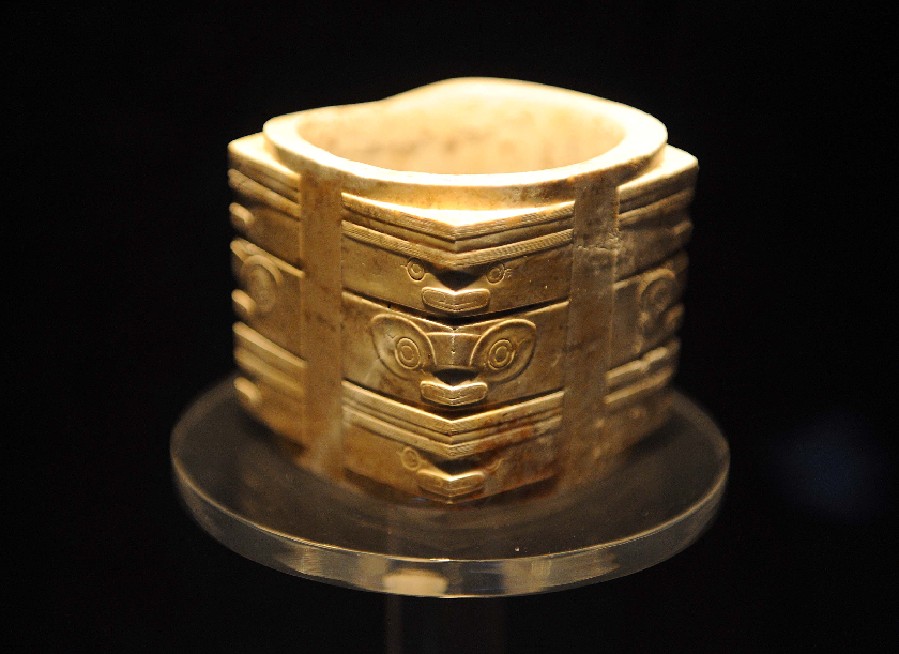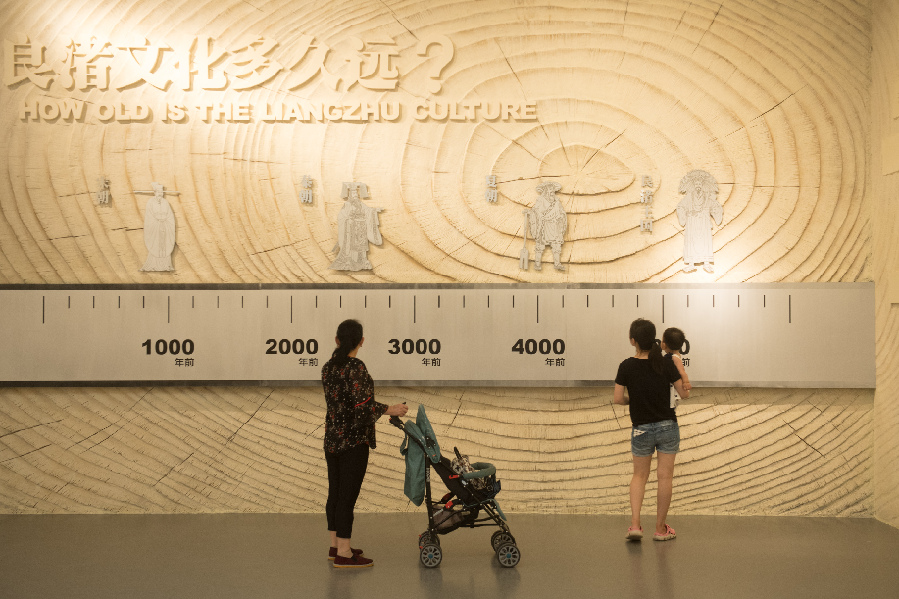
Photo taken on March 9, 2011 shows a Cong, a rectangular jade with the round hole, which was serviced as a ritual object in ancient China, in a museum within the "Liangzhu national ruins park" in east China's Zhejiang Province. (Xinhua/Xu Yu)
by Xinhua writers Jin Jing, Zhang Dailei
CAMBRIDGE, Britain, July 5 (Xinhua) -- The Liangzhu Archaeological Site in east China, a candidate for the UNESCO heritage status, is "a site of primary importance" for study of the early Chinese civilization and human civilization, said a leading British archaeologist.
Located on the plain of river networks on the outskirts of Hangzhou, capital of east China's Zhejiang province, the ancient city of Liangzhu dating to 3,300-2,300 BC offers profound and compelling evidence that Chinese civilization started 5,000 years ago, 1,000 years earlier than previously anticipated, said Colin Renfrew, retired professor of Archaeology at University of Cambridge and fellow of the British Academy, in an interview with Xinhua.
The jade artifacts, ways of irrigation and control of flooding by the dams excavated at the Liangzhu site all showed Liangzhu was "a highly organized society," thus taking the start of Chinese civilization 1,000 years earlier than the widely recognized civilization of Shang Dynasty around 1,500 BC, said Renfrew.
"So when we are talking of the origins of state society in China, we can think of the Liangzhu sort of 3,000 BC or a little bit later than that, instead of the Shang civilization around 1,500 BC. So it does definitely take 1,000 years earlier, the inception of organized society, complex society, or if you like the term, state society in China," he said.

People visit the new Liangzhu Museum in Hangzhou, capital of east China's Zhejiang Province, June 26, 2018. More than 600 cultural relics are exhibited at the museum which reopened on Monday after ten months of renovation. (Xinhua/Weng Xinyang)
The professor welcomed Liangzhu's possible recognition by UNESCO as a world heritage, saying that Liangzhu is "particularly important" for study of the origin of human civilization.
"I think it's very appropriate that the World Heritage organization recognize the importance of some very early sites. And that is, of course, where Liangzhu is so particularly important... It's well worth being on the World Heritage List of UNESCO," he said.
Renfrew has visited Liangzhu twice since 2013 and has been fascinated by the site. In 2018, he published a co-authored article titled "The emergence of complex society in China: the case of Liangzhu," calling for global attention on the significance of the Liangzhu site. He also incorporated Liangzhu into his latest edition of widely recognized textbook "Archaeology: Theories, Methods and Practice."
The professor lauded efforts by Chinese authorities and archaeologists to protect and promote historical heritages.
"It's certainly clear that the Chinese Academy of Sciences, and the Institute of Archaeology in Beijing have been doing a very good job for many decades, and continue to do so. It's important for any nation to open its doors and have people visiting it know about its early past."

Photo taken on March 9, 2011 shows a general view of Liangzhu relic site, a Neolithic site, in east China's Zhejiang Province. (Xinhua/Xu Yu)
Regarding Liangzhu in particular, Renfrew described it as "naturally a feather in China's cap," showcasing the great early Chinese civilization in parallel with other ancient civilizations such as Mesopotamian, the Indus Valley, the ancient Greek, Indian and Mayan civilizations.
The World Heritage Committee is now holding its 43rd session in Baku, Azerbaijan, to examine inscription of new sites on World Heritage List, with Liangzhu being one of the strong candidates. However, the professor said whether or not Liangzhu is put on the UNESCO list doesn't change much the fact that Liangzhu is a site of "primary importance."
"It doesn't make very much difference to me whether it's on the World Heritage List or not. It is a site of primary importance," said Renfrew.
"For me, personally, it's already one of the great early sites of China, and one of the great earliest sites of the world," he said.



